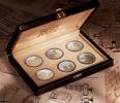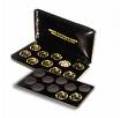
 |
 |
 |
 |
Collecting Coins Reviews
What Affects The Value Of A Coin
What Are Factors That Affect The Value Of Coins?
When one is just starting in coin collecting, often the first dispute is: “What is the value of the coin?: and the answer is that the coin will cost as much as you are willing to salary for it and the amount can vary considerably. For instance, a coin dealer’s offer can be much less than a coin collector that unquestionably wants your coin badly to add in his collection.
The following are factors that can influence the true value of a coin.
1. Grade or condition of the coin. Your coin will be worth or valued more when it is in satisfying condition. When in a perfect or unblemished mint condition, an “uncirculated” coin will be worth many times more than a similar coin that has been in circulation.
2. The rarity of a coin is the principal basis for a coins value. Generally, the rarer that a coin is organize to be, the higher it is priced. Do keep in mind that rarity has very little influence on the coins age. Chinese coins are a thousand years aged normally sell for about plush dollars since there are so many of them; while a “1913 Rope Head Nickel” can sell for up to or over a million dollars because only five specimens are known to be in existence.
3. Bullion value. A coin's precious metal content can determine its value. A platinum, silver or gold coin will not, in general sell for less than the coins value when melted.
4. Demand. There are coins that are greatly in demand; sought after by many collectors, and if that a particular coin is in great demand the price will be matching in addition. Even comparatively plentiful coins can mandate higher value when they are down pat with coin collectors.
For instance, “1916 D dimes” are much more abundant than the “1798 dimes” yet in spite of this, “1916 D dimes” sell for so much more because there are many more individuals collecting 20th century dimes than 1700 dimes.
Here’s how you can determine the approximate value of your coin:
1. Properly, accurately, and correctly recognize and classify your coin, and know the to place value on that coin. You can do this successfully by examining your coin in a catalogue or online with the “coin price guide”; this will give you an idea of the going rate and price of your particular coin and you can determine the approximate value of your coin.
Everyday coin values are changing; so you need to use a “coin price guide” that is updated on a daily basis to obtain the current coin value. Look at online sites that offer step by step manipulation on how to recognize your coin the proper way.
2. Grade your coin based on your widespread observation and examination of its current condition.
3. Consult coin catalogues for a brochure of retail prices in or estimates of your coins retail value. “A Guide Book of United States Coins”, popularly known as " The Red Book " to coin dealers and collectors, provides information on retail coin prices for US coins and is available in libraries, coin shops and bookstores. “The Standard Catalog of World Coins” ( in volumes ) is a guide commonly used by coin dealers and collectors as hearty, to provide information on world coins and is available in many public libraries.
You can also agree current coin prices by basing it on the actual dealer coin price fix in magazines and newspapers or online auctions such as Yahoo, Coin World, eBay or Teletrade.
Always keep in mind that you are not collecting coins primarily for money; you collect for enjoyment and self gratification, and profit is to be last consideration. The stock fact that a certain coin does not have a large monetary value, does not necessarily suggest that it is no longer interesting or fascinating or that it must not stage included in your collection.
Each coin will have a certain interest in itself, regardless of the condition that it is in and regardless of its monetary value. There will always be a unmistakable characteristic that will frame you to that particular coin; so when it does, then you should have it in your collection. Have lively!
Share This With Your Friends |
Do S And Dont S Of Coin Collecting
Coin Collecting Tips For Beginners
More Collecting Coins Articles
... a numismatist may also be a coin collector and vise versa. Over the years, coin collection has been especial recognized. The most common designs are famous people and animals to depict the stage when the specific coin was released. Numismatists are generally taken in appliance of money, its origin, appearance, ...
... usually have overhead costs that are low so they are able to offer similarly low prices on coins they sell. Do not forget to thoroughly inspect a particular dealer s policies before returning an item. Lead to sure that once you receive your coin, immediately revolve it for authenticity or damage. The ...
... person duty easily detect if the wrong metal was used for the counterfeiting. If the person is a collector of such items, he should be more aware of these coins. A collector needs to be more concerned with the collectible rare coins because this is position counterfeiters benefit frequently - their aim ...
Do S And Dont S Of Coin Collecting
... is that you are doing it for the right reason - if it is a passion, then it is something worth pursuing. Collecting just for profit may work but it usually is not enough in the rangy run. A person all has to presume about this since many people who have objective it for that reason have lost focus and ...

|
| Copyright © 2006-2012 Internet Marketing Tools, All Rights Reserved |